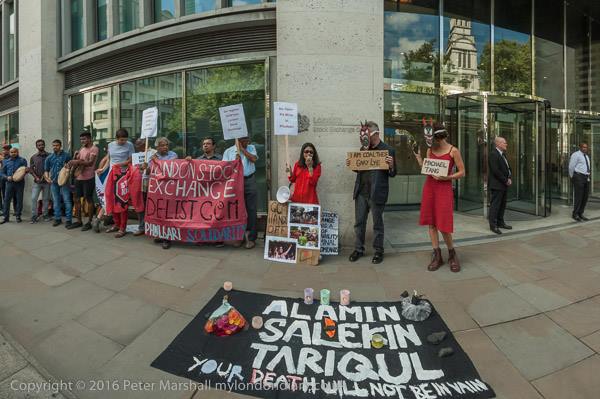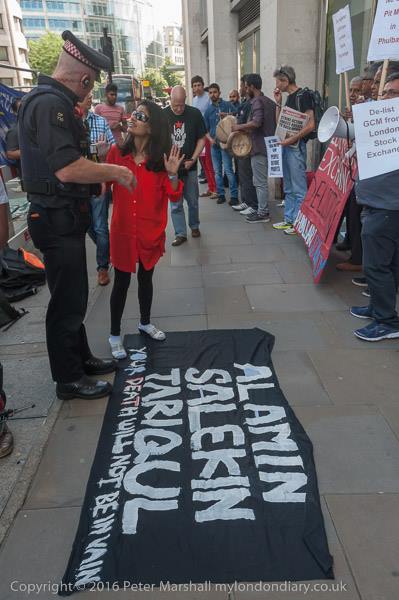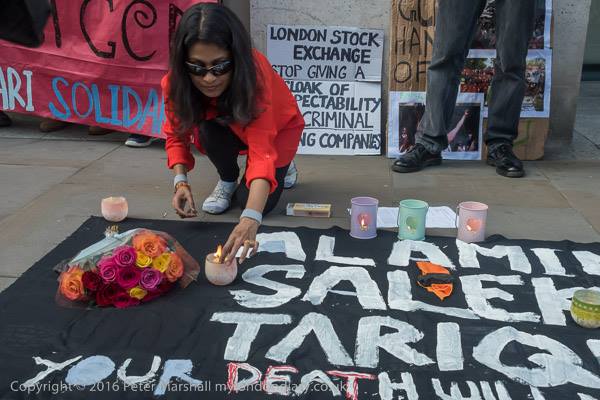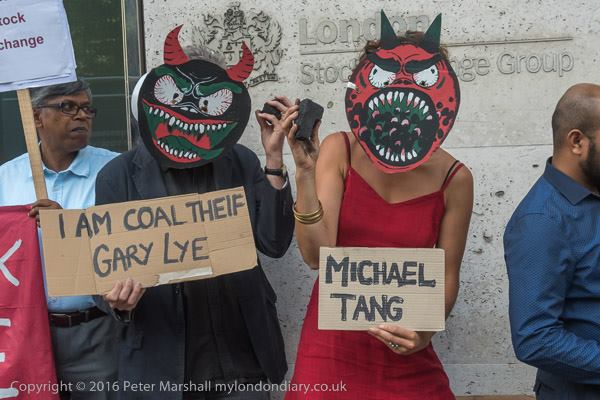
Commemoration and celebration go together at London Stock Exchange 26 August 2016 Photo credit: Peter Marshall
PHULBARI DAY VIGIL TURNS INTO HEATED DEMO
By Paul Dudman
Friday the 26th August, marked a decade of halt to plans by an AIM-listed British company, Global Coal Resources Management (GCM), who want to build a massive open cast coal mine by forcibly displacing 130,000 people in Phulbari, northwest Bangladesh. A four day long Commemoration for victims of Phulbari outburst, where three protesters were shot dead by police in 2006, was held in Dkaka, Dinajpur, Phulbari, London and Germany.
On the final day of remembrance, on 30th August, the National Committee to Protect Oil, Gas, Mineral Resources, Power and Ports in Bangladesh has declared a fresh programme in Phulbari to kick GCM out of Bangladesh as the CEO of the company has recently filed multiple arbitrary charges against indigenous farmers, small businessmen and local leaders who opposed the mine.
In London Bangladeshi and South Asian community activists under the banner of Phulbari Solidarity Group held a colourful and powerful commemoration rally outside the London Stock Exchange , calling for the de-listing of the company from London’ share market. Despite heavy securitization and repeated attempts of interruptions by British police, angry protesters blocked the pavement of the entrance of London Stock Exchange for two hours and demanded immediate de-registration of GCM for its unethical business, deceitful marketing of Phullbari project, and for human rights abuse in Dinajpur and Phulbari.
Of what was meant to be a Red Vigil for Victims of Phulbari has turned into a commemoration come noise demo as the CEO of London Stock Exchange, Xavier Rolet KBE, failed to respond to the protesters’ call for de-listing of GCM. Priorhand, the Phulbari Solidarity Group has contacted the CEO of London Stock Exchange and submitted evidence of unethical business of the company. But the CEO did not respond to their request for an appointment, said Rumana Hashem of Phulbari Solidarity Group.

Police objects to the blockade of LSE pavement but PSG Founder Rumana Hashem says:” the banner for the victims will not be removed.” Photo credit: Peter Marshall
A remembrance vigil was held, followed by an angry demo with Santal and Tamil drumming, and ended with tribute being paid by laying wreaths, flowers and lighting candles for the three people who were killed by paramilitary force, allegedly paid by the company, in Phulbari on 26 August in 2006.
Wearing masks of Gary Lye (CEO of GCM) and Michael Tang (the Chairman of the company), the protesters sang Phulbari jingles against coal mine. The protest observed a three-minute silence for the three victims, Al Amin, Mohammad Salekin, and Tarikul Islam, who died in the Phulbari shooting. Dressed in red, blue and black, protesters laid down a banner for victims, stating “YOUR DEATH WILL NOT BE IN VAIN”, on the pavement of the London Stock Exchange.
Protesters from Bangladesh were joined by international and British environmental campaigners, and advocates for human rights, anti-mining movement and workers rights.

GCM CEO Gary Lye and company Chairman Michael Tang stood as numb and blatant guilty. Photocredit: Peter Marhsall
Dressed in red, blue and black protesters outside the London Stock Exchange paid a two-hour homage to the victims. A banner, stating “YOUR DEATH WILL NOT BE IN VAIN” was laid on the pavement of the London Stock Exchange Group’s Headquarter for International Trading.
Protesters from Bangladesh were joined by international and British environmental campaigners, and advocates for human rights, anti-mining and workers rights. Among others, Foil Vedanta, European Action for Climate, London Mining Network, Global Justice Campaign, the Socialist Party of England and Wales, Tamil Solidarity, UK Commitee to Protect Resources of Bangladesh, and Voice of Freedom have made it explicit that they will stand with Phulbari people in their struggle.
The sound of compassion, sadness, empowerment and resistance echoed in the protest, and the firm speeches by passionate activists and outrageous crimes by British multinational companies overseas was heard by the entire Paternoster Square on Friday – although none from London Stock Exchange seemed concerned about these crimes.
Simultaneously, tributes were paid to the victims of Phulbari at National Martyrs Monument in Dhaka, and red vigil and cultural events took place in Phulbari under the banner of National Committee to Protect Oil, Gas, Mineral Resources, Power and Port in Bangladesh (NCBD in short). In the four-day commemoration events (26-30 August) and celebration of the halt, they demanded the ban of the company in Bangladesh for its ongoing abuse of activists in Phulbari and increasing corruption in Bangladesh.

Christine Hague of Global Justice Now told about how partially OECD complaint against GCM was treated by UK NCP. Photo credit: Peter Marshall
The company has been allegedly involved in various forms of abuse and harassment of local activists and opponents of the proposed Phulbari mine. Media report on the brutal death of Nasrin Huq , the former executive director of Action Aid in Dhaka, revealed that in 2005 Huq was killed brutally in her car park for her opposition to the project. A report to which the company was unable to respond was published in the Observer.[i] Later in 2006 three people were shot dead and two hundred injured in a demonstration of 80,000 people who marched against plans by the company. Local organisers have reported that the company has bribed the paramilitary personnel and forced them to open fire against the decision of the Police Magistrate on duty who stated that there was no permission for shooting on people. There were over 200 people injured and many abused on the same day. The day has been called Phulbari Day since, and powerful resistance in the aftermath of the shooting against open-cast mine in Phulbari has put a decade long halt to the project. Government has cancelled the company’s license. But the company has been pushing the government to give them a go ahead.
 The company’s CEO, Gary N Lye, has been allegedly harassing opponents of the project and the company has been extremely abusive to indigenous farmers, local organisers of Phulbari outburst, and small business entrepreneurs who demanded the company’s ban in Phulbari. After the shooting and deaths of three people on 26 August in 2006, Gary Lye stated that he is businessman and he understands nothing but coal. In a live interview with Farzana Rupa on ATN Bangla TV, Lye said: “I am a businessman , my business is to extract coal. It is not my business to know who dies and who cries” (ATN Bangla News, 26 August 2006). Locals have declared that this CEO is unwanted in Phulbari and when he attempted to re-enter Phulbari town he was resisted by locals in November 2014.
The company’s CEO, Gary N Lye, has been allegedly harassing opponents of the project and the company has been extremely abusive to indigenous farmers, local organisers of Phulbari outburst, and small business entrepreneurs who demanded the company’s ban in Phulbari. After the shooting and deaths of three people on 26 August in 2006, Gary Lye stated that he is businessman and he understands nothing but coal. In a live interview with Farzana Rupa on ATN Bangla TV, Lye said: “I am a businessman , my business is to extract coal. It is not my business to know who dies and who cries” (ATN Bangla News, 26 August 2006). Locals have declared that this CEO is unwanted in Phulbari and when he attempted to re-enter Phulbari town he was resisted by locals in November 2014.
Background
Last month, a day before the International Mangrove Action Day when Bangladeshis was focused on the controversial deal on Rampal power plant, the company has filed multiple cases against 26 key indigenous organisers and local leaders, farmers, small scale business entrepreneurs, and students who opposed the mine in Phulbari. The arbitrary charges formed on 25 July, 2016, at Dinajpur Magistrate Court appeared as extremely abusive and the next hearing on 7 September will be a crucial day for all those fighting the fraught.
The NCBD has declared a fresh programme on Phulbari Day to fight GCM and ban the Phulbari project. This includes rally demanding a ban of the company in Phulbari on 25 October, blockade of the Dinajpur District Commissioner’s Office on 21 November and half-day strike in Phulbari on 21 December. If demands are unfulfilled by December, intense and unending strike would start. Phulbari Solidarity Group believes that that this will not be needed as activists in London will hold the company to account and will ensure a ban of GCM from London Stock Exchange before the end of this year.

Protesters is paying tribute to the victms of Phulbari with flowers and by lighting candles on 26 Aug 2006 at London Stock Exchange. Photo credit: Kerima Mohiuddin
Although GCM does not have a valid contract with Bangladesh, they are selling shares in the name of Phulbari project. The company has changed its name from Asia Energy to Global Coal Management in 2010, and continued lobbying for Phulbari coal mine in Bangladesh. If the mine is built, 130,000 families of farmers in Phulbari would be forcibly displaced. It would destroy 14,600 hectares of highly cultivable land, would pose threats to clean water resources and would leave devastative impact on one of the world’s largest mangrove forests and UNESCO heritage site, the Sunderbans. Despite grave concerns at national and international level, and declaration made by seven UN rapporteurs, GCM is pushing the government to give it a go ahead.

Arguments with Police – a community leader tells Police not to interfere with demonstrators. Photo credit: Peter Marshall

Phulbari Solidairty Group’s Founder and an eye witness to the shooting in 2006, Dr Rumana Hashem, lights a candle for the victims of Phulbari at the entrance of London Stock Exchange. Photo credit : Peter Marshall
Contact for further information: 07714288221, 07956260791.
Further news, photos and videos:
Ten years of Resistance to Phulbari Open Cast Mine: Peter Marshall’s Mylondondiary.co.uk
A video of the noise-demo to de-list GCM from London Stock Exchange (by Pete Mason of Socialist Party of England and Wales): https://youtu.be/-_cKiRWt9NI
London Stock Exchange targeted by Bangladeshi activists: Foil Vedanta report
Phulbari Day protest outside London Stock Exchange: Begum24.com by Ansar Ahemd Ullah
[i] The mystery death of Nasrin Huq –a report to which the company was not able to respond to, was derived from http://www.guardian.co.uk/world/2006/sep/03/bangladesh, last cited on 01. 01. 2013
An Eye Witness of the shooting and outburst in Phulbari: Keeping Coal Resources under the Ground with Blood, A Different Revolution
New Programme to Kick GCM out of Bangladesh declared on Phulbari Day: BNP is Not our Friend































 The authorities of the Barapukuria Coal Mine Company (BCMC) have rejected the feasibility study report of the Institute of Water Modelling (IWM) on open-pit mining at Barapukuria North, as it did not match the study’s “terms of reference (TOR)”. “The study did not reflect the impact of open-pit mining on the groundwater level as a result of dewatering, irrigation and supply of drinking and industrial water. We need a further detailed report,” a senior IWM official told The Independent on Monday.
The authorities of the Barapukuria Coal Mine Company (BCMC) have rejected the feasibility study report of the Institute of Water Modelling (IWM) on open-pit mining at Barapukuria North, as it did not match the study’s “terms of reference (TOR)”. “The study did not reflect the impact of open-pit mining on the groundwater level as a result of dewatering, irrigation and supply of drinking and industrial water. We need a further detailed report,” a senior IWM official told The Independent on Monday.
You must be logged in to post a comment.